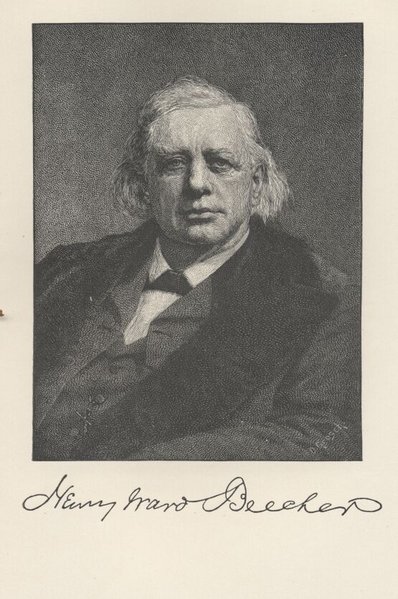
Henry Ward Beecher
Henry Ward Beecher (June 24, 1813 – March 8, 1887) was an American Congregationalist clergyman, social reformer, and speaker, known for his support of the abolition of slavery, his emphasis on God's love, and his 1875 adultery trial. His rhetorical focus on Christ's love has influenced mainstream Christianity to this day. Beecher was the son of Lyman Beecher, a Calvinist minister who became one of the best-known evangelists of his era. Several of his brothers and sisters became well-known educators and activists, most notably Harriet Beecher Stowe, who achieved worldwide fame with her abolitionist novel Uncle Tom's Cabin. Henry Ward Beecher graduated from Amherst College in 1834 and Lane Seminary in 1837 before serving as a minister in Lawrenceburg, Indiana and later in Indianapolis's Second Presbyterian Church when the congregation resided at Circle Hall at Monument Circle. In 1847, Beecher became the first pastor of the Plymouth Church in Brooklyn, New York. He soon acquired fame on the lecture circuit for his novel oratorical style in which he employed humor, dialect, and slang. Over the course of his ministry, he developed a theology emphasizing God's love above all else. He also grew interested in social reform, particularly the abolitionist movement. In the years leading up to the Civil War, he raised money to purchase slaves from captivity and to send rifles—nicknamed "Beecher's Bibles"—to abolitionists fighting in Kansas. He toured Europe during the Civil War, speaking in support of the Union. After the war, Beecher supported social reform causes such as women's suffrage and temperance. He also championed Charles Darwin's theory of evolution, stating that it was not incompatible with Christian beliefs. He was widely rumored to be an adulterer, and in 1872 the Woodhull & Claflin's Weekly published a story about his affair with Elizabeth Richards Tilton, the wife of his friend and former co-worker Theodore Tilton. In 1874, Tilton filed charges for "criminal conversation" against Beecher. The subsequent trial resulted in a hung jury and was one of the most widely reported trials of the century. After the death of his father in 1863, Beecher was unquestionably "the most famous preacher in the nation". Beecher's long career in the public spotlight led biographer Debby Applegate to call her biography of him The Most Famous Man in America. |
Birth and Death Data: Born 1813 (Litchfield), Died March 8, 1887 (Brooklyn)
Date Range of DAHR Recordings: 1917
Roles Represented in DAHR: author
 = Recordings are available for online listening.
= Recordings are available for online listening.
 = Recordings were issued from this master. No recordings issued from other masters.
= Recordings were issued from this master. No recordings issued from other masters.
Recordings
| Company | Matrix No. | Size | First Recording Date | Title | Primary Performer | Description | Role | Audio |
|---|---|---|---|---|---|---|---|---|
| Victor | B-19623 | 10-in. | 4/27/1917 | The meaning of our flag | William Sterling Battis | Recitation, with drums and bugle | author |
Citation
Discography of American Historical Recordings, s.v. "Beecher, Henry Ward," accessed November 19, 2024, https://adpprod2.library.ucsb.edu/names/101894.
Beecher, Henry Ward. (2024). In Discography of American Historical Recordings. Retrieved November 19, 2024, from https://adpprod2.library.ucsb.edu/names/101894.
"Beecher, Henry Ward." Discography of American Historical Recordings. UC Santa Barbara Library, 2024. Web. 19 November 2024.
DAHR Persistent Identifier
External Sources
Wikipedia: Henry Ward Beecher
RILM: Henry Ward Beecher
Britannica: Henry Ward Beecher
Linked Open Data Sources
LCNAR: Beecher, Henry Ward, 1813-1887 - http://id.loc.gov/authorities/names/n50007898
Wikidata: Henry Ward Beecher - http://www.wikidata.org/entity/Q1607404
VIAF: http://viaf.org/viaf/12628790
ISNI: 0000 0001 1021 3315 - http://www.isni.org/isni/0000000110213315
Wikipedia content provided under the terms of the Creative Commons BY-SA license
Feedback
Send the Editors a message about this record.
